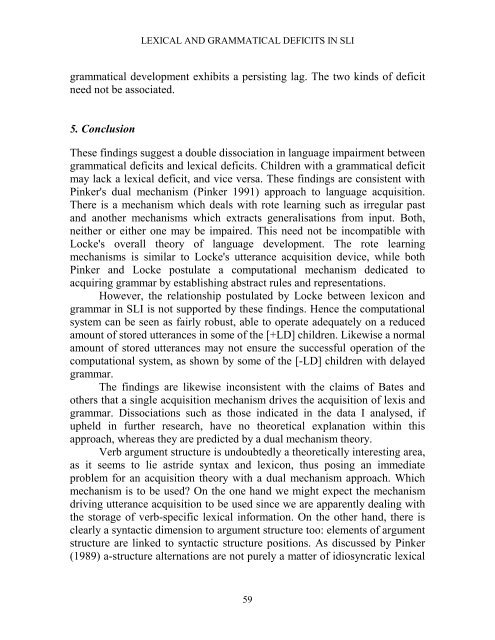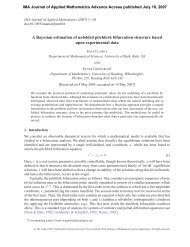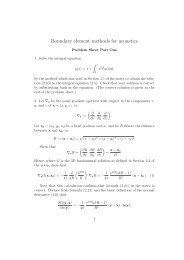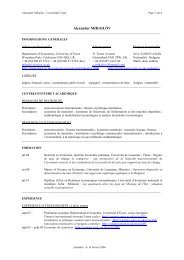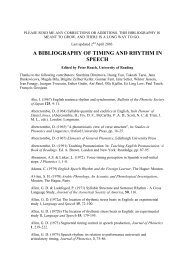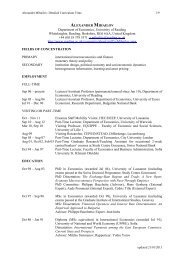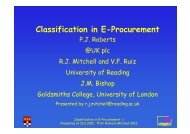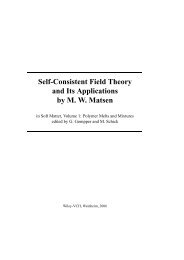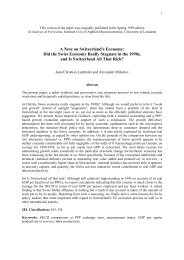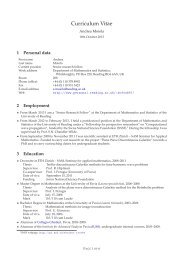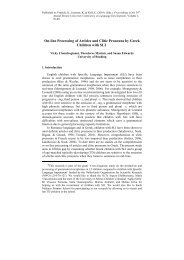Reading Working Papers in Linguistics 4 (2000) - The University of ...
Reading Working Papers in Linguistics 4 (2000) - The University of ...
Reading Working Papers in Linguistics 4 (2000) - The University of ...
You also want an ePaper? Increase the reach of your titles
YUMPU automatically turns print PDFs into web optimized ePapers that Google loves.
LEXICAL AND GRAMMATICAL DEFICITS IN SLI<br />
grammatical development exhibits a persist<strong>in</strong>g lag. <strong>The</strong> two k<strong>in</strong>ds <strong>of</strong> deficit<br />
need not be associated.<br />
5. Conclusion<br />
<strong>The</strong>se f<strong>in</strong>d<strong>in</strong>gs suggest a double dissociation <strong>in</strong> language impairment between<br />
grammatical deficits and lexical deficits. Children with a grammatical deficit<br />
may lack a lexical deficit, and vice versa. <strong>The</strong>se f<strong>in</strong>d<strong>in</strong>gs are consistent with<br />
P<strong>in</strong>ker's dual mechanism (P<strong>in</strong>ker 1991) approach to language acquisition.<br />
<strong>The</strong>re is a mechanism which deals with rote learn<strong>in</strong>g such as irregular past<br />
and another mechanisms which extracts generalisations from <strong>in</strong>put. Both,<br />
neither or either one may be impaired. This need not be <strong>in</strong>compatible with<br />
Locke's overall theory <strong>of</strong> language development. <strong>The</strong> rote learn<strong>in</strong>g<br />
mechanisms is similar to Locke's utterance acquisition device, while both<br />
P<strong>in</strong>ker and Locke postulate a computational mechanism dedicated to<br />
acquir<strong>in</strong>g grammar by establish<strong>in</strong>g abstract rules and representations.<br />
However, the relationship postulated by Locke between lexicon and<br />
grammar <strong>in</strong> SLI is not supported by these f<strong>in</strong>d<strong>in</strong>gs. Hence the computational<br />
system can be seen as fairly robust, able to operate adequately on a reduced<br />
amount <strong>of</strong> stored utterances <strong>in</strong> some <strong>of</strong> the [+LD] children. Likewise a normal<br />
amount <strong>of</strong> stored utterances may not ensure the successful operation <strong>of</strong> the<br />
computational system, as shown by some <strong>of</strong> the [-LD] children with delayed<br />
grammar.<br />
<strong>The</strong> f<strong>in</strong>d<strong>in</strong>gs are likewise <strong>in</strong>consistent with the claims <strong>of</strong> Bates and<br />
others that a s<strong>in</strong>gle acquisition mechanism drives the acquisition <strong>of</strong> lexis and<br />
grammar. Dissociations such as those <strong>in</strong>dicated <strong>in</strong> the data I analysed, if<br />
upheld <strong>in</strong> further research, have no theoretical explanation with<strong>in</strong> this<br />
approach, whereas they are predicted by a dual mechanism theory.<br />
Verb argument structure is undoubtedly a theoretically <strong>in</strong>terest<strong>in</strong>g area,<br />
as it seems to lie astride syntax and lexicon, thus pos<strong>in</strong>g an immediate<br />
problem for an acquisition theory with a dual mechanism approach. Which<br />
mechanism is to be used? On the one hand we might expect the mechanism<br />
driv<strong>in</strong>g utterance acquisition to be used s<strong>in</strong>ce we are apparently deal<strong>in</strong>g with<br />
the storage <strong>of</strong> verb-specific lexical <strong>in</strong>formation. On the other hand, there is<br />
clearly a syntactic dimension to argument structure too: elements <strong>of</strong> argument<br />
structure are l<strong>in</strong>ked to syntactic structure positions. As discussed by P<strong>in</strong>ker<br />
(1989) a-structure alternations are not purely a matter <strong>of</strong> idiosyncratic lexical<br />
59


